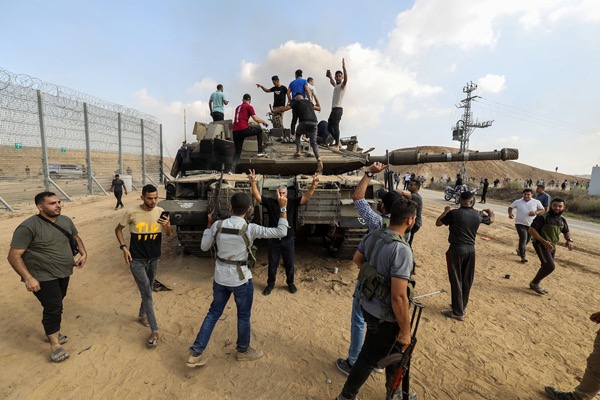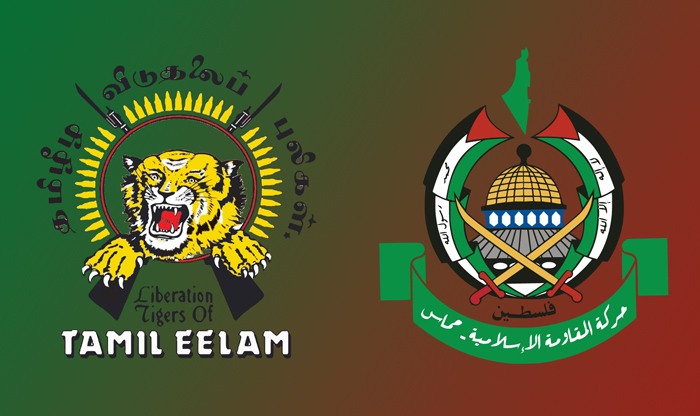 How did Hamas do it on October 7? This time, I don't mean to ask how they had so little humanity as to butcher over 1,200 innocents in Israel in a single day of horrors, the largest massacre of Jews since the Holocaust. Nor do I refer to the level of brainwashing or innate evil necessary to kill 370 young people at a dance party, to rape and genitally mutilate screaming women and girls, or to drag 250 hostages – including 12 Americans – back to Gaza. No, at present, I am speaking of practical and, ultimately, financial capability: how was Hamas able to afford the trucks, the motorcycles, the assault weapons and grenades, the paragliders and massive tunnel networks that enabled their terroristic invasion on that black day? To a large extent, the answer can be found at a single address: Qatar, the absolute monarchy on the Arabian peninsula that is the beating heart of modern terrorism financing.
How did Hamas do it on October 7? This time, I don't mean to ask how they had so little humanity as to butcher over 1,200 innocents in Israel in a single day of horrors, the largest massacre of Jews since the Holocaust. Nor do I refer to the level of brainwashing or innate evil necessary to kill 370 young people at a dance party, to rape and genitally mutilate screaming women and girls, or to drag 250 hostages – including 12 Americans – back to Gaza. No, at present, I am speaking of practical and, ultimately, financial capability: how was Hamas able to afford the trucks, the motorcycles, the assault weapons and grenades, the paragliders and massive tunnel networks that enabled their terroristic invasion on that black day? To a large extent, the answer can be found at a single address: Qatar, the absolute monarchy on the Arabian peninsula that is the beating heart of modern terrorism financing.
According to a newly revealed report by the Shin Bet, Israel's internal security agency, one of the reasons that enabled Hamas to build up its forces for the October 7 onslaught was "the flow of money from Qatar to Gaza and its delivery to Hamas's military wing" This occurred in partnership with the better known bête noire of the United States and Israel in the Middle East, the rogue state of Iran, which has been officially designated as a State Sponsor of Terrorism by the U.S. State Department since 1984. Overall, the Shin Bet determined that Hamas's achievement of strike capacity "was to a large degree due to the strategic buttress provided by Iran and the use of the funds that came in from Iran and Qatar."
What explains the deep involvement of Qatar in antisemitism and international terrorism? In a word: ideology. Qatar's official version of Islam is the stark form called Wahhabism. Since the 1990s, Qatar has positioned itself as the major funder of the radical front for Islamist political theocracy known as the Muslim Brotherhood throughout the Middle East and North Africa. Hamas, which Qatar has heavily funded, is the Palestinian branch of the Muslim Brotherhood, and its 1988 founding charter commits it to the destruction of the State of Israel and the establishment of an Islamic theocracy in its place. Qatar was the primary physical residence and base for Hamas's international leadership from 2012 until late 2024, when American pressure grew too great in the wake of the October 7 massacre,.
Qatar's reach stretches far beyond direct terrorism – its persuasive reach has astonishing access through Qatar's state-owned media corporation, Al Jazeera. Al Jazeera has become a household name worldwide, and many Westerners are surprised to learn that the channel, which has provided media access for radical figures from Saddam Hussein to Osama bin Laden, is the property of the Qatari government and, as such, has never once voiced criticism of the Qatari state or its royal family. Not only Israel but also several Arab states have scrutinized Qatar's Al Jazeera for its platforming of Hamas, for which it provides highly slanted positive coverage and boosting.
So why is Qatar, a small maritime state, so powerful when it seems so vulnerable on a map? Because unlike Iran, with its regular "Death to America" chants, Qatar has never publicly positioned itself in opposition to the American-led international order. Far from it: the largest United States air base in the Middle East, al Udeid Air Base, which played a critical role in the fight against ISIS, is hosted by Qatar. The Qatari government has contributed billions of dollars to the base's development. The United States military's Central Command (CENTCOM), responsible for security in the Middle East and Central Asia, maintains its forward operating headquarters in Qatar.
Indeed, Qatar's "soft power" globally, including in the United States, goes far beyond media reach or security cooperation. The wealthy Qatar Development Fund, a state-owned investment entity, has poured resources into critical and sensitive United States infrastructure. Notably, Qatar has invested billions in U.S. higher education, with research indicating that Qatar-funded groups are behind many of the antisemitic and pro-Hamas "protests" that have roiled U.S. campuses since Hamas launched its war on October 7, 2023. Much of this Qatari funding has not been reported to the U.S. Department of Education, as required by law, with Yale University, for example, having allegedly concealed millions of dollars in Qatari investments that are believed to have fueled anti-Israel attitudes on campus.
Qatar is wealthy and powerful mainly because the United States and its allies have allowed it to be, and the consequences are now plain for all to see. Unlike Iran, Qatar is not a large, mountainous country with millions of inhabitants; it is a small, low-lying peninsula with a total population under 3 million, of whom about 90% are foreign noncitizens. It is an absolute monarchy whose ruling al Thani dynasty retains a complete monopoly on political power. Now, it is upon the U.S. Congress to designate Qatar for what it is – a major state sponsor of terrorism – and to impose sanctions on its ruling class. Doing so would compel change and dry up one of the primary financial sources of instability in today's world. Failing to change the status quo risks leading to more horrors like those the Qatari-sponsored terrorists perpetrated in Israel on October 7, 2023.
 Bassem Eid is a Jerusalem-based Palestinian political analyst, human rights pioneer and expert commentator on Arab and Palestinian affairs. He grew up in an UNRWA refugee camp. Follow him on X (formerly Twitter) @realbassemeid
Bassem Eid is a Jerusalem-based Palestinian political analyst, human rights pioneer and expert commentator on Arab and Palestinian affairs. He grew up in an UNRWA refugee camp. Follow him on X (formerly Twitter) @realbassemeid
Copyright © 2025. Investigative Project on Terrorism. All rights reserved.



 Emerson on Jihadi Terrorism in 2025
Emerson on Jihadi Terrorism in 2025
 The Rise and Fall of the Misconceptions From the River and the Sea
The Rise and Fall of the Misconceptions From the River and the Sea
 A Rajapaksa Plan for the Total Destruction of Hamas
A Rajapaksa Plan for the Total Destruction of Hamas